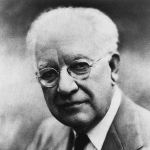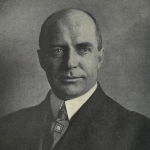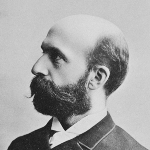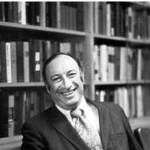Background
Louis Wirth was born on August 28, 1897, in Gemünden, Germany. He was a son of Joseph Wirth, a cattle dealer, and Rosalie Lorig. He was one of seven children. The family was Jewish and both of his parents were religiously active.

1945
5801 S Ellis Ave, Chicago, IL 60637, United States
Louis Wirth at the University of Chicago teaching a class.
Louis Wirth served as the secretary and treasurer of the American Sociological Association in 1931. He was the president of the association in 1947-1948.
Louis Wirth was a founding member and the first president in 1949-1952 of the International Sociological Association.
Louis Wirth was a member of the Urban League.
Louis Wirth was a member of the American Jewish Committee.
Louis Wirth was the president of the University of Chicago Quadrangle Club.
Louis Wirth teaching students.
Louis Wirth, educator, sociologist, author.
5801 S Ellis Ave, Chicago, IL 60637, United States
Louis Wirth earned a Bachelor of Arts, a Master of Arts, and a Doctor of Philosophy from the University of Chicago.

















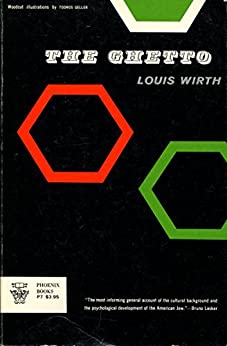
(The Ghetto traces back to the medieval era the Jewish imm...)
The Ghetto traces back to the medieval era the Jewish immigrant colonies that have virtually disappeared from our modern cities - to be replaced by other ghettoes. Analytical as well as historical, Louis Wirth's book lays bare the rich inner life hidden behind the drab exterior of the ghetto. The book describes the significant physical, social, and psychic influences of ghetto life upon the Jewish.
https://www.amazon.com/gp/product/B08C9HTPXX/ref=dbs_a_def_rwt_hsch_vapi_tkin_p1_i0
1928
Louis Wirth was born on August 28, 1897, in Gemünden, Germany. He was a son of Joseph Wirth, a cattle dealer, and Rosalie Lorig. He was one of seven children. The family was Jewish and both of his parents were religiously active.
Louis Wirth and his siblings attended the local Protestant elementary school in Gemünden, Germany, and were taught religion and Hebrew privately. Most children from Gemünden went to work after finishing the eighth grade and very few had the opportunity to go on to secondary school. Wirth's mother strongly supported her children's education. When Wirth finished grade school, his mother arranged for her brother, Isaac Lorig, to take Wirth and his older sister, Flora, to the United States where her four brothers lived so they could continue their education. In 1911, Wirth and his sister moved to Omaha, Nebraska, to live with Emanuel Lorig and his family. There they learned English and went to high school. Wirth worked in his uncle's dry goods store. The uncle expected him to help with the business once he graduated from high school. Instead, Wirth excelled in academics and won a scholarship to the University of Chicago.
Wirth began his college career as a pre-medical student, but soon realized he was more interested in sociology. At that time the famous "Chicago School" of sociology was just beginning. He was educated by the founders of this classical school - Albion Small, W.I. Thomas, Robert Park, Ernest Burgess, and George Mead. They developed a particular approach to urban sociology, focusing especially on immigration and assimilation, which strongly shaped Wirth's academic career. He embraced the city of Chicago and took advantage of the cultural, educational, and political resources that it had to offer. During this time he developed his political beliefs, which were decidedly anti-capitalist. He also reconsidered his religious beliefs, declaring himself to be an atheist. Wirth served as president of the Cosmopolitan Club, which was concerned with world political and social issues.
Louis Wirth received his Bachelor of Arts degree in 1919 and began to work full time as a social worker for Jewish Charities of Chicago. He was still enrolled at the University of Chicago as a part-time graduate student. After 1923, became a full-time graduate student. He completed a Master of Arts degree in 1925 and his dissertation a year later, earning a Doctor of Philosophy.
Wirth's graduate work explored how Jewish immigrants assimilated into American culture. He used his position at the Jewish Charities in Chicago to interview Jewish families and try to understand how they adapted to urban American life after living in rural European communities. Wirth concluded that there was "cultural conflict" between old values and new experiences that led to social disorganization among Jewish immigrant communities. According to biographer Roger A. Salerno, Wirth's graduate work was his "first significant expression of interest in urban social disorganization, ghetto life, assimilation, consensus, and urban cultural conflict."
Wirth pursued these themes in his doctoral dissertation on the Jewish ghetto. This work was published as a book called The Ghetto in 1928 and was Wirth's only authored book published during his academic career. It was well-received in the academic community as a representative of the "Chicago school" and important work in Jewish studies. The Ghetto traces the segregation of the Jews from ancient times, when segregation was self-selective, to the Middle Ages, when it was mandated by law. Characterizing the Jewish ghetto throughout history as a "city within a city," he outlines how these practices carried over to the modern-day Chicago Jewish community.
Louis Wirth pursued a varied and productive professional career. His interests ranged widely, covering such fields as urbanization, community study, social planning, housing, social organization, human ecology, race relations, nationalities, minority groups, international relations, social theory, and the sociology of knowledge. To each of these areas, he brought a fresh perspective, realistic insight, and a high order of originality. He was equally at home in the realm of theory and the field of minute empirical fact, and he had the rare gift of bringing the two into fruitful confluence. So outstanding was he in this respect that his advice and guidance were often sought by social scientists, scholars, government officials, foundations, research agencies, and action groups. That he was able, amid these formidable demands, to write so much of high professional quality is a tribute to his great capacity and his gifted mind.
In 1919, Louis Wirth started to work as a social worker, serving as director of the delinquent boys' division of the Bureau of Personal Service in 1919-1922. He began teaching part-time at the University of Chicago as an instructor in 1925 and remained there until 1928. When he did not receive a permanent teaching position at Chicago, in 1928, he moved with his wife Rosalie and daughter, Elizabeth, to New Orleans, where he got a teaching position as an associate professor at Tulane University. Wirth remained at Tulane until 1930, but his contract was not renewed after that. It is believed that Wirth's progressive views on racial assimilation did not sit well with conservative southern university officials.
Wirth spent the following year traveling in Europe on a fellowship from the Social Science Research Council. He was studying the sociology of knowledge and met with some of the leading European scholars of that time, including Karl Mannheim. While he was in Europe, his former mentor, Robert Park, became acting chairperson of the Department of Sociology at the University of Chicago. He offered Wirth a faculty position. In 1931, Wirth became an assistant professor, in 1932 - an associate professor, and in 1940 - a full professor at the University of Chicago.
Wirth was associate editor of the American Journal of Sociology from 1926 to 1928, and again from 1931 until he died in 1952. He was a research fellow in Europe for the Social Science Research Council in 1930-1931. In 1932, Wirth and one of his graduate students, Edward Shils, finished a translation of Karl Mannheim's book Ideology and Utopia.
In 1938, Wirth and his assistant, Margaret Furez, compiled the first Local Community Fact Book containing important census data on 75 Chicago communities. The book became instantly popular among academics and public officials alike. The same year, Wirth published his most famous paper, Urbanism as a Way of Life, in the American Journal of Sociology. This paper was Wirth's only published attempt at proposing a formal theory of urbanism. It combined both European and Chicago School perspectives to analyze urbanization as a social process. In Urbanism as a Way of Life, Wirth defines cities as large areas populated densely by heterogeneous people. He views urbanism, the growth of cities at the expense of rural areas, to be a continuing trend in modern society. Moreover, as his theory of "new urbanism" states, the process of living in a large city changes the way people relate to one another. Primary relationships are not as important as secondary relationships, and secondary relationships tend to be superficial and revolve around the limited roles people assume: banker, cashier, doorman, mail carrier, etc. Wirth explains how and why people tend to group themselves together - by religion or race-based on the laws of homogeneity, a fact that leads to segmentation of urban life, which although it may be detrimental to community involvement, often leads to a satisfactory measure of personal freedom. According to biographer Roger A. Salerno, "It represents the epitome of classic urban sociological literature. By utilizing the concepts, methods, and pragmatic posture of his teachers, Louis Wirth attempted to create a theory of urbanism which would be representative of an urban sociological paradigm in the tradition of the Chicago school." In this essay, Wirth wrote that "The distinctive feature of man's mode of living in the modern age is his concentration into gigantic aggregations around which cluster lesser centers and from which radiate the ideas and practices that we call civilization."
Wirth became the director of planning for the Illinois Post War Planning Commission in 1944, an era in which it was recognized that sociologists, as well as architects and engineers, were necessary to create successful communities. Wirth conducted little sociological research on his own and never fully developed his concept of "new urbanism," preferring instead to practice applied sociology and spread his influence through his involvement in professional organizations.
Aside from academic responsibilities, Louis Wirth was also involved in citizen groups and government projects. He spent more of his time speaking in public than in writing. He regularly attended professional meetings, conferences on housing, public hearings, and various community group meetings.
Louis Wirth made a significant contribution to sociology through his studies of urban life and the social problems of urban residents. He was famous for his research, mostly concerning how Jewish immigrants adjusted to life in the urban United States, as well as the distinct social processes of city life. His work has had a great influence on later work in urban studies. Wirth was an inspiring and highly effective teacher and mentor, stimulating and guiding a surprisingly large number of graduate students who have since risen to prominent positions in sociology and in other areas. In 1930, he earned a Social Science Research Council fellowship.
(The Ghetto traces back to the medieval era the Jewish imm...)
1928Louis Wirth was an adherent of anti-capitalistic views. His knowledge of life in Germany during and after his migration to the United States helped him to arrive at the conclusion that, despite its imperfections, American democracy was the best hope for liberalism. Wirth believed that sociologists could make a major contribution towards protecting and developing liberal ideals and practices. They could help to make democracy workable in modern urban industrial societies; for example, through the fashioning of effective planning techniques.
Louis Wirth was an early supporter of urban planning and advocated the regulation of housing development, zoning, and land use. He defined the city as "a relatively large, dense, and permanent settlement of socially heterogeneous individuals." Wirth believed that the development of institutions and bureaucracies created an impersonal, segmented, and superficial lifestyle which would lead to personal and community breakdown. Because of these views, the "Wirthian" perspective became associated with a pessimistic type of urban theory. However, Wirth himself also saw beneficial features of urban life. In particular, he noted that the city afforded a great deal of personal freedom and mobility that led to greater opportunities for personal expression and creativity.
Intellectuals, according to Louis Wirth, had a special responsibility to uncover their own "unstated assumptions." In analyzing social ideals, they should "determine the degree to which they are congruent with the cultural configurations of the groups which are exposed to them," as well as examining their inconsistencies, interrelations, and implications. Intellectuals should strive for greater understanding among themselves and learn to use the powerful means of worldwide communications at their disposal. Wirth himself was a frequent broadcaster. He believed that sociological knowledge should be applied to practical problems and had a strong sense of social commitment.
Quotations: "I believe the time is past when we will be educating and training sociologists primarily to go out into the world to educate and train other sociologists... more and more of them will be using their sociological knowledge as research workers, as analysts and as policymakers in... government, labor, business, welfare, and education. They will be involved in the field of international relations, in industrial relations, labor relations, administration, race relations, social work, social psychiatry, mass communications, housing, planning... There they will have to win their way by what they can contribute to the understanding and solutions of problems of human social life."
Louis Wirth was the president of the Society for Social Research. He was a founder and director of the American Council on Race Relations. Wirth was a member of the Public Administration Clearing House, the American Society of Planning Officials, the National Association of Intergroup Relations.

Louis Wirth served as the secretary and treasurer of the American Sociological Association in 1931. He was the president of the association in 1947-1948.
American Sociological Association , United States
1931 - 1948

Urban League , United States

American Jewish Committee , United States

Louis Wirth was the president of the University of Chicago Quadrangle Club.
University of Chicago Quadrangle Club , United States

Louis Wirth was a founding member and the first president in 1949-1952 of the International Sociological Association.
International Sociological Association
1949 - 1952
Quotes from others about the person
"Wirth not only emphasizes that some of the most important knowledge sociologists might gain was the knowledge of how to make things work but also that this kind of understanding could best be gained in action to change things…Wirth's "competent sociologist" was one who experiences the reality he investigates and assumes the full role of citizen, as well as the role of scientist qua scientist…The interplay of scholarly interest, citizen role, and sociological expert or investigator, are exemplified in Wirth's case both in his writing and in his public and professional life." - Albert Reiss
"Wirth was convinced that the fate of society depended on the determined efforts of men to harness cultural differences to bring about a harmonious and progressive world order." - Zane L. Miller
Louis Wirth met Mary Bolton, a student from Paducah, Kentucky, and a future social worker in 1917. In 1922, he returned to Germany for the first time since 1911 and brought Mary Bolton with him to meet his family. There was some tension in the family towards the interfaith relationship, but they soon learned to like his future wife. When the couple returned to the United States they were married on February 14, 1923. As Wirth was establishing his academic career in Chicago, he was also trying to help his family escape Nazi Germany. At this time Wirth and his wife lived in a small apartment near the university with their two daughters, Elizabeth and Alice. In the late 1930s, the Wirths sponsored the immigration of 13 relatives from Germany, including Wirth's parents. The family members lived in the Wirth apartment until they were able to establish themselves. In 1941, the Wirths were finally able to buy a house.
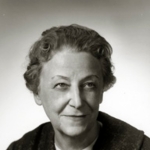
Mary Bolton Wirth had a distinguished career as a social worker over a period of more than fifty years, principally in the city of Chicago. She served as Executive Secretary of the Chicago chapter of the American Association of Social Workers in 1939-1949 and as Supervisor of Community and Tenant Relations with the Chicago Housing Authority in 1952-1958. After 1958, she consulted on public housing.
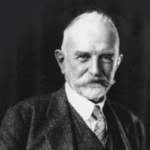
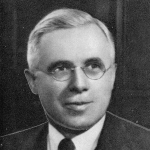
Ernest Watson Burgess was a Canadian-American sociologist, known for his research into the family as a social unit. He taught at the Universities of Toledo, Ohio, and Kansas and at Ohio State University before beginning a long career at the University of Chicago (1916-1966), becoming a professor emeritus in 1951.
